 | |||
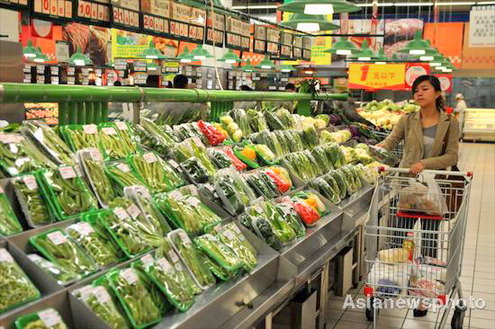 |
Major Macro Economic Statistics | ||
| Growth indexes | Price indexes | ||
| Industrial output:+14.8% | CPI:+5.4% | ||
| Retail sales:+17.4% | PPI:+7.3% | ||
| Urban fixed-asset investment: +25% | PMI:+53.4% | ||
| FDI: +32.9% | Housing prices | ||
| GDP: +9.7%(Q1) | Foreign trade indexes | ||
| Financial indexes | Import:$400.7b | ||
| New loans: 2.24t yuan(Q1) | Export:$399.6b | ||
| M2: +16.6% | Trade balance:$140 million | ||
| Fiscal revenue:+26.7% | |||
|
Data and Graphic | |||
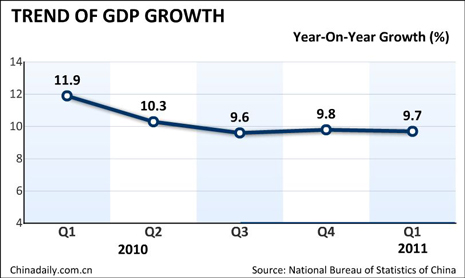 |
Chinese economy expands 9.7% in Q1 China's economy expanded 9.7 percent in the first quarter of 2011 from a year earlier, and 2.1 percent from the previous quarter to 9,631.1 billion yuan ($1,459.3 billion), the National Bureau of Statistics (NBS) said on April 15. "The national economy had a good beginning with steady and relatively fast growth," said Sheng Laiyun, spokesman of the NBS. [Full story] | ||
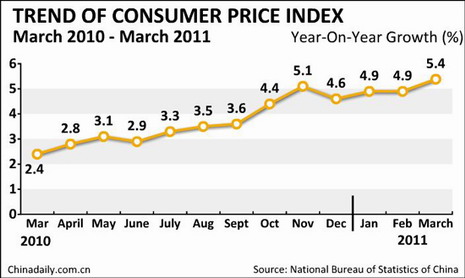 |
China's CPI growth hits 32-month high in March China's consumer price index (CPI), a main gauge of inflation, rose 5.4 percent in March from a year ago, a 32- month high, the nation's statistic agency said on Friday. CPI stood at 5 percent for the first quarter, according to the National Bureau of Statistics (NBS). Food prices surged 11 percent year-on-year. [Full story] | ||
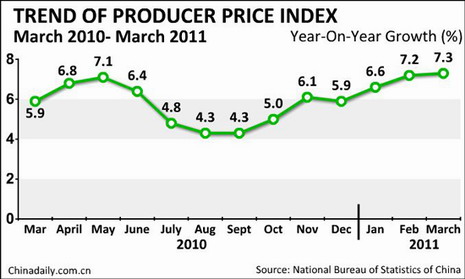 |
March PPI growth advances to 30-month high China's producer price index (PPI), a main gauge of inflation at the wholesale level, rose 7.3 percent in March from a year ago, the highest in the past 30 months, the statistical agency said on Friday. PPI was up 0.6 percent from February. The quarterly PPI was up 7.1 percent year-on-year, the National Bureau of Statistics (NBS) said. [Full story] | ||
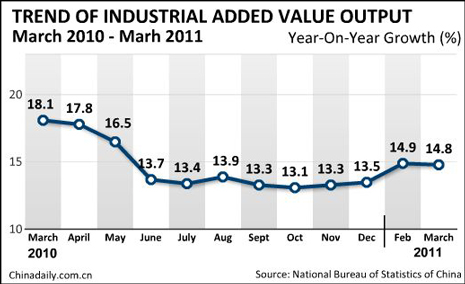 |
Industrial value-added output rises 14.4% in Q1 China's industrial value-added output grew 14.4 percent year-on-year in the first quarter of this year, the National Bureau of Statistics (NBS) announced on Friday. The growth rate was higher than the 14.1-percent rise in industrial value-added output in the first two months. [Full story]
| ||
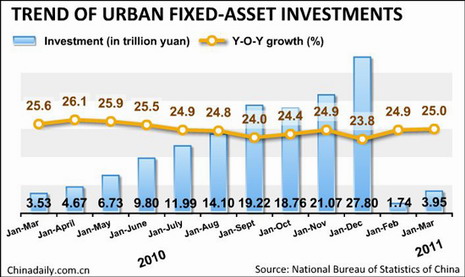 |
China's Q1 fixed-asset investment up 25% The fixed asset investment in China rose 25 percent in the first quarter of this year, the National Bureau of Statistics (NBS) announced Friday. In March, the urban fixed asset investment rose 1.73 percent from February, figures released Friday by the NBS showed. [Full story] | ||
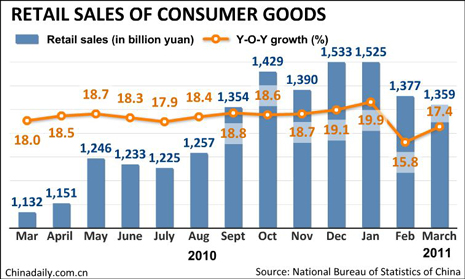 |
China's retail sales up 16.3% in Q1 China's retail sales of consumer goods rose 16.3 percent year on year to 4.2922 trillion yuan ($657.29 billion) in the first quarter this year, the National Bureau of Statistics (NBS) announced on Friday. Sheng Laiyun, spokesman with the NBS, said that the retail sales of March grew 17.4 percent from a year earlier, and edged up 1.34 percent from February. [Full story] | ||
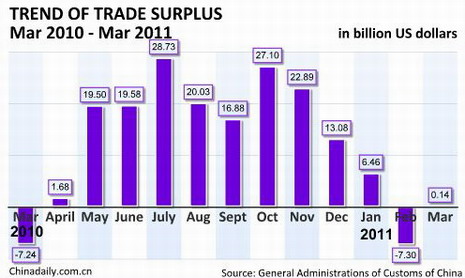 |
First quarterly trade deficit in 7 years China reported its first quarterly trade deficit in seven years, but analysts said it will not be repeated in the coming months as tighter monetary policies, introduced to combat inflation, slow import growth. China registered a deficit of $1.02 billion in the first quarter, compared with a surplus of $13.9 billion last year, according to the General Administration of Customs. [Full story] | ||
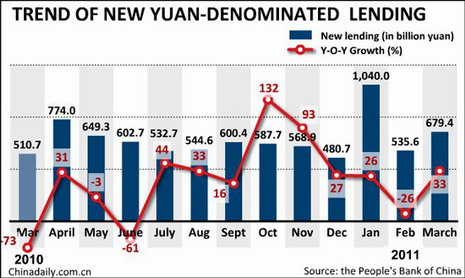 |
China' new loans stand at 2.24t yuan in Q1 The People's Bank of China (PBOC), the country's central bank, said Thursday that new yuan-denominated loans stood at 2.24 trillion yuan ($342.83 billion) in the first quarter of 2011. The figure was 352.4 billion yuan less than that in the same period of last year, said the PBOC in a statement on its website. [Full story] | ||
|
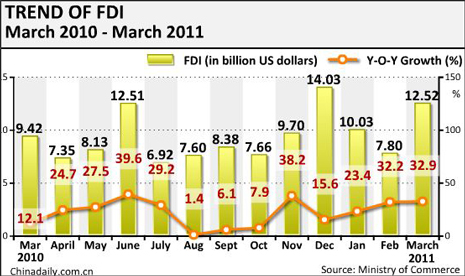 |
China's March FDI up 32.9% yr-on-yr Foreign direct investment (FDI) in China grew 32.9 percent year-on-year in March to reach $12.52 billion, the Ministry of Commerce (MOC) said Tuesday. FDI in China has seen marked gains this year, with an increase of 29.4 percent year-on-year in the first quarter of this year to $30.34 billion. [Full story] | ||
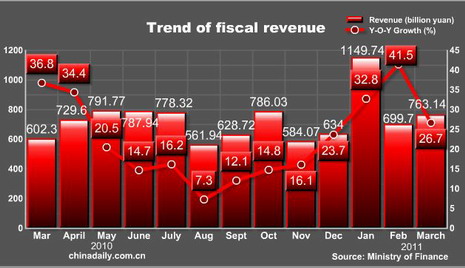 |
China Q1 fiscal revenue rises 33% China's Ministry of Finance said on Friday the country's fiscal revenue rose 33.1 percent year-on-year to 2.61 trillion yuan ($401.54 billion) in the first quarter. In March, the nation's fiscal revenue jumped 26.7 percent from one year earlier to 763.14 billion yuan, down from the 41.5-percent growth in February and January's 32.8-percent increase, the ministry said in a statement on its website. [Full story] | ||
|
Comments and Opinions | |||
|
SHANGHAI - Chinese Premier Wen Jiabao urged the continuation of efforts to maintain the stability of prices and prevent excessive hikes and drastic economic fluctuations while he was on an inspection tour in East China's Zhejiang province on Friday and Saturday. "Keeping overall price levels stable has been the top priority of the current macro regulations," said Wen. With more Chinese cities taking a hard line in controlling rising house prices by rolling out a series of policies, demand has been dampened recently along with the cost of housing. [Full story] | |||
|
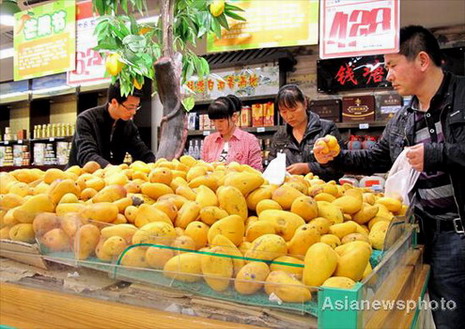 China's faster-than-expected growth in exports and imports last month may allow the government to strengthen its fight against inflation, which probably exceeded its target for the ninth straight month in March. Overseas shipments jumped 35.8 percent and imports climbed 27.3 percent year-on-year, unexpectedly pulling the trade balance into surplus after a $7.3 billion shortfall in February, the customs bureau said on Sunday. [Full story] | |||
|
No time for policy pause The second interest rate hike so far this year highlights Chinese policymakers' determination to firmly check inflation even as the risks to global growth keep increasing. Tentative signs indicate that China's economy is slowing, but they are far from compelling enough to justify a pause in monetary tightening. Instead, growing uncertainties about global growth should propel the Chinese government to prepare more action for preventing imported inflation. [Full story] | |||
|
Fighting soaring oil prices and inflation As the era of cheap energy is ending, oil prices began climbing faster. They are rising even faster after Western forces launched attacks on Libya. The prices are currently close to $110 a barrel. Oil-rich Libya was producing 1.69 million barrels a day before the unrest, according to the International Energy Agency (IEA). It is now producing 400,000 barrels a day. Currently, the symptoms of overheating are confined to a few countries such as Brazil and Indonesia. Though Japan's nuclear crisis caused oil prices to fall a few percentage points, there is no doubt about the rising trend. And as the IEA has said, sustained high oil prices could damage world economic recovery. But the disruptive developments in several North African and Middle Eastern countries, which have led to rising oil prices, is intensifying the risk of overheating elsewhere. [Full story] | |||
|
Rebalanced trade growth China's much improved trade growth is not only the welcome result of the country's strenuous efforts to boost domestic consumption, it is also cause for optimism that more balanced international trade will help sustain the ongoing global recovery. Figures from the General Administration of Customs showed that, on the back of a 29.5-percent increase in the total value of imports and exports, China saw a trade deficit of $1.02 billion from January to March this year, the first quarterly trade deficit in six years. [Full story] | |||

